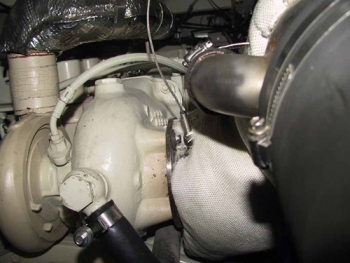Diesel
Engine Overload
Diesel engines have reputations
for long lives, yet many recreational marine diesels don't make it past the
first several hundred hours of operation. Overloading is a common life-reducer
in modern marine diesel engines. Yet while many books describe diesel engine
maintenance, few discuss overload.
Boat
manufacturers want to be able to quote the highest possible cruise speed with a
given engine configuration and, as a consequence, are motivated to prop the
boat for maximum speed prior to rigging, fueling, provisioning, filling the
bait tanks, etc. The configuration will pass the engine manufacturers sea
trial in this configuration but, once the boat is delivered and fully loaded,
the engines are in pearl. For example, our boat is listed by the
manufacturer as 24,000 lbs but weighs in at just under 29,000 lbs when lifted
at the yard. The boat as delivered is between 1" and 2" over-pitched
depending upon eventual use.
We wanted our engines to last
well, so we researched the topic and made some changes to our setup. Later, we
posted an article to our website to describe our results. As we write this
introduction, our engines have run without issue for over 3,000 hours.
Here is a link to our original diesel engine overload article posted in 2002.
Below are selected answers to questions that we have received from readers
since then.
Original Article: Avoiding Diesel
Engine Overload
Follow-up Questions:
Stern
Drives
Comments on stern drives.
Gauge
Selection
The specific ISSPRO gauges that we
installed.
Fuel
Consumption
Determine fuel consumption and HP
produced.
Restricted
Air Intake
Insufficient engine room
ventilation can also cause sooting.
Crankshaft Bearing Failure
Over-propping can occur in many
ways.
Exhaust
Gas Temperature
To properly use exhaust gas
temperature to gauge engine load, you need engine manufacturer specifications
for your engine and you need to know where the temperature is measured.
WOT
Measured By RPM
RPM isn't actually the only
indication of load. There are actually are others and, in fact, RPM isn't
really a good predictor of load.
Diesel RPM
Too Low?
Light load is good as long as the
engines are at full temperature.
Overloaded
for One Season OK?
Fixing an overload is inexpensive
compared to the price of an engine.
Select References:
Articles by Tony Athens
Tony Athens of Seaboard Marine is a frequent contributor to Boatdiesel.com and he knows Cummins products
incredibly well having installed 100's over the years. We particularly
recommend the article "Engine Life vs. Engine Loading."
Why EGT is Important
This article discusses EGT with
respect to truck engines, but the advice applies to marine diesels.

